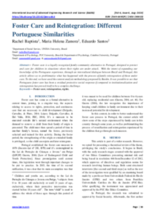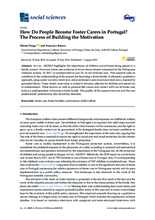Displaying 21 - 30 of 48
The purpose of this webinar is to shed light on the specific experiences and issues of unaccompanied and separate girls in the European Response.
This article examines the family reintegration process for those in care in Portugal and Brazil.
This open access research from the journal of Social Sciences aims to contribute to the understanding of the reasons for becoming a foster family in Portugal.
This article describes the process of revising a measure of out‐of‐home living restrictiveness to be culturally congruent for Portugal, providing preliminary data on validity and reliability, and discusses the feasibility of using this measure in Portugal.
This study aims at analyzing adoption-related feelings, which include the feelings of loss and the ensuing curiosity about the birth family and pre-adoption life.
This study explored the social images of families of children and youths in residential care in a sample of 176 participants with and without professional contact with this population.
The aim of this study is to compare the subjective well-being (SWB) of children hosted in institutions and in foster families with the well-being of children living with their families. Results indicate that children in residential care have a lower SWB in all variables compared to foster care and general populations groups.
This study focused on health promotion for children and young adults who live in residential care institutions in Portugal.
This study aims to analyze the comparative effectiveness of Youth Self-Report (YSR) and the Strengths and Difficulties Questionnaire (SDQ) as screening tools of psychological (mal)adjustment, looking for differences in the way psychological problems and difficulties are identified by these two measures in adolescents in residential care (RC).
This study compared adolescents in residential care (RC) in Portugal, with a Portuguese community sample on the incidence of mental health problems and psychosocial skills, explored gender differences and the relationships between mental health problems and psychosocial competencies.


